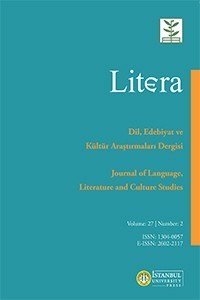The Pathos in Turkey’s Journalistic Discourse Toward Syrian Migrants
Following the civil war that broke out in 2011 in Syria, Turkey has so far welcomed more than 3.5 million Syrians. At the beginning of this migration, Syrians were perceived favorably, because the Turkish people believed that Syrians would go back to their country at the end of the civil war. Unfortunately, this war continues and the Syrians, now numbering 3,609 842 million, have not returned to their country. Meanwhile, the Turkish people face growing socioeconomic problems such as unemployment, inflation, and the Arabization of signs on the streets of the country, creating much more xenophobic and racist feelings and acts toward Syrians. The media has played an important role in the construction of this discourse and this work aims to analyze this discourse. To do this, we will analyze some randomly selected news reports and headlines published between 2014 and 2018 from national and regional newspapers. We will answer the questions: “How are Syrians represented in the newspapers?” “What is the role of media and journalistic discourse in building the positive and/or negative ethos of Syrians?,” and “How does journalistic discourse influence the reader?
Keywords:
Journalistic discourse, pathos, ethos, Syrians, manipulation migration,
___
- Amossy, R. (2006). L’argumentation dans le discours. Paris : Armand Colin.
- Barthes, R. 1964, Rhétorique de l’image, Communication 4, 44-51. https://www.persee.fr/doc/comm_0588-8018_1964_num_4_1_1027, consulté le 10 mai 2019.
- Charaudeau, P. (2005) Les médias et l’information. Belgique : De Boeck.
- Charaudeau, P. (2008). « Pathos et discours politique », M. Rinn (éd), Emotion et Discours, Rennes : Presses Universitaires de Renne, pp.49-58.
- Danblon, E. (2005). La fonction persuasive, Anthropologie du discours rhétorique : origines et actualité. Paris : Armand colin.
- Declercq, G. (1992). L’art d’argumenter. Paris : Editions Universitaires.
- Kerbrat-Orecchioni, C. (1997). L’énonciation, de la subjectivité dans le langage. Paris : Armand Colin.
- Michelli, R. (2010). L’émotion argumentée. Paris : Editions du Cerf.Maingueneau, D. (1999). « Ethos, scénographie, incorporation », dans Images de soi dans le discours – La construction de l’ethos, éd. Ruth Amossy, Lausanne, Delachaux et Niestlé, p. 75-100.
- Maingueneau, D. (2002). « Problèmes d’ethos », Pratiques, 113, p. 55-68.
- Perelman, C., Olbrechts-Tyteca, L. (2008). Traité de L’argumentation. Bruxelles : Editions de l’Université de Bruxelles.
- Plantin, C., (2011). Les bonnes raisons des émotions. Berne : Peter Lang.
- Rinn, M., (2008). Emotions et Discours. Rennes : Presses Universitaires de Rennes.
- https://www.liberation.fr/planete/2016/07/03/turquie-erdogan-favorable-a-la-naturalisation-des-refugies-syriens_1463698, consulté le 10 mai 2019.
- https://orientxxi.info/magazine/les-refugies-syriens-ebranlent-la-turquie-et-l-union-europeenne,1687, consulté le 10 mai 2019.
- https://www.sciencespo.fr/enjeumondial/en/odr/les-refugies-syriens-en-turquie, consulté le 10 mai 2019.https://m.bianet.org/bianet/toplum/185321-medyada-suriyeli-multeciler-nasil-yer-aliyor, consulté le 10 mai 2019.
- http://uidder.org/yalan_carpitma_ve_hedef_saptirma_isci_kardes_bunlara_inanma.htm, consulté le 10 mai 2019.
- https://hrantdink.org/tr/asulis/yayinlar/72-medyada-nefret-soylemi-raporlari/1265-medyada-nefret-soylemi-ve-ayrimci-soylem-2017-raporu, consulté le 10 mai 2019.
- http://www.halklarinkoprusu.org/2017/06/halklarin-koprusu-dernegi-turkiye-multeci-raporu/, consulté le 10 mai 2019.
- https://hrantdink.org/tr/asulis/faaliyetler/projeler/medyada-nefret-soylemi/934-medyada-suriyeli-multecilere-yonelik-nefret-soylemi-videosu-yayinlandi, consulté le 10 mai 2019.
- https://www.hurriyet.com.tr/gundem/basbakan-yardimcisi-kaynak-kimsenin-suc-isleme-ozgurlugu-yoktur-40509701, consulté le 10 mai 2019.
- https://www.amnesty.fr, consulté le 10 mai 2019.
- https://gallica.bnf.fr/ark:/12148/bpt6k1065498g/f103.item, consulté le 10 mai 2019.https://www.gazeteler.de/, consulté le 10 mai 2019
- Başlangıç: 1954
- Yayıncı: İstanbul Üniversitesi
